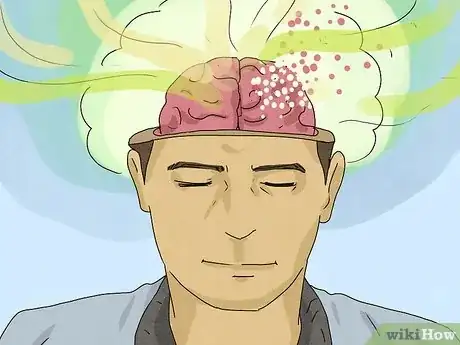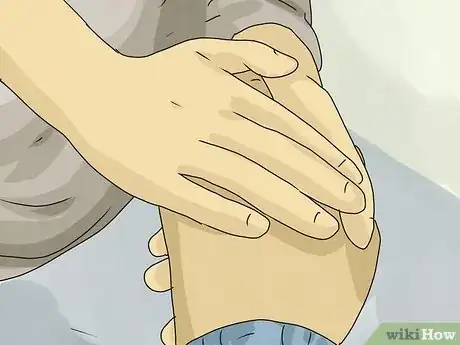This article was co-authored by Kirsten Parker, MFA and by wikiHow staff writer, Hannah Madden. Kirsten Parker is a Mindset and Action Coach based in her hometown of Los Angeles, California. She helps high achievers overcome stress and self-doubt. She specializes in increasing one's confidence and clarity by incorporating tools from positive psychology, mindful habit change, and self-regulation into her coaching. She is a Certified HeartMath Practitioner trained in Stress, Anxiety, and Intelligent Energy Management along with Emotional Intelligence and the Science of Self-Acceptance. She also holds an MFA from Yale University School of Drama in Stage Management.
There are 11 references cited in this article, which can be found at the bottom of the page.
This article has been viewed 48,323 times.
Surrendering to the present moment can reduce self-judgment and make your life a lot easier to live. While this is an individual process that may look different for everyone, there are some helpful tips you can use to guide you along your journey. In this article, we’ll teach you how to surrender yourself and live in the now, rather than dwelling on things that have happened in the past. Over time, you’ll come to accept who you are and live in the present moment.
Steps
Expert Q&A
-
QuestionHow do I train myself to be present?
 Ira IsraelIra Israel is a Licensed Counselor and Psychotherapist who has been in private practice for over 14 years. He specializes in teaching others about happiness and authenticity. Ira teaches sold-out Happiness and Authenticity workshops at Esalen Institute and Kripalu Center and has written over 400 articles on psychology, philosophy, Buddhism, yoga, film, art, music & literature for The Huffington Post, Good Men Project, Mind Body Green, Thrive Global, and Medium. Ira is also the author of How to Survive Your Childhood Now That You’re an Adult: A Path to Authenticity and Awakening. He attended The University of Pennsylvania and has graduate degrees in Psychology, Philosophy, and Religious Studies.
Ira IsraelIra Israel is a Licensed Counselor and Psychotherapist who has been in private practice for over 14 years. He specializes in teaching others about happiness and authenticity. Ira teaches sold-out Happiness and Authenticity workshops at Esalen Institute and Kripalu Center and has written over 400 articles on psychology, philosophy, Buddhism, yoga, film, art, music & literature for The Huffington Post, Good Men Project, Mind Body Green, Thrive Global, and Medium. Ira is also the author of How to Survive Your Childhood Now That You’re an Adult: A Path to Authenticity and Awakening. He attended The University of Pennsylvania and has graduate degrees in Psychology, Philosophy, and Religious Studies.
Licensed Counselor and Psychotherapist You should focus on your anchor! Every person has to find the most desirable anchors for them, and the most common one is the breath. If you're concentrating on your breath and you start to have distractions, just gently guide your awareness back to the breath.
You should focus on your anchor! Every person has to find the most desirable anchors for them, and the most common one is the breath. If you're concentrating on your breath and you start to have distractions, just gently guide your awareness back to the breath.
References
- ↑ https://www.nhs.uk/mental-health/self-help/tips-and-support/mindfulness/
- ↑ https://www.youtube.com/watch?v=pEnjM1jC1Rw&t=52s
- ↑ https://eckharttolle.com/the-power-of-non-resistance/
- ↑ https://www.psychologytoday.com/us/blog/inviting-monkey-tea/201605/when-its-time-let-go-control-and-surrender
- ↑ https://eckharttolle.com/the-power-of-non-resistance/
- ↑ https://www.psychologytoday.com/us/blog/inviting-monkey-tea/201605/when-its-time-let-go-control-and-surrender
- ↑ https://au.reachout.com/articles/how-acceptance-can-help-you-cope-with-things-out-of-your-control
- ↑ https://positivepsychology.com/self-awareness-matters-how-you-can-be-more-self-aware/
- ↑ https://au.reachout.com/articles/how-to-challenge-negative-thoughts
- ↑ https://www.psychologytoday.com/us/blog/mindful-musings/201611/3-reasons-let-yourself-feel-your-emotions
- ↑ https://www.psychologytoday.com/us/blog/what-mentally-strong-people-dont-do/202005/how-make-peace-your-past
- ↑ https://greatergood.berkeley.edu/article/item/ten_ways_to_become_more_grateful1
- ↑ https://www.mentalhealth.org.uk/campaigns/kindness/kindness-matters-guide












-Step-17.webp)





















-Step-17.webp)




































